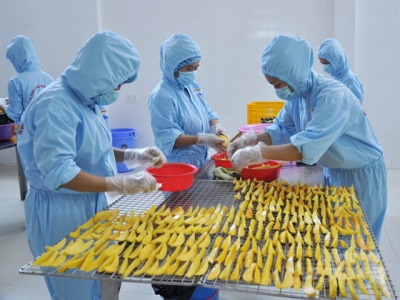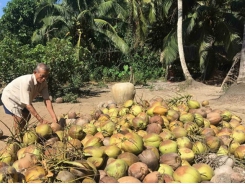Many difficulties to export vegetables and fruits to China during the Lunar New Year

The export of some kinds of agricultural products to the China is expected to face many difficulties during the Lunar New Year, due to changes in the country's import policy.
In the year-end period, especially during the Lunar New Year, vegetables and fruits will face difficulties when exporting to the Chinese market. Photo: TL.
At the online forum "Connecting supply and demand of fruit trees" held recently, Mr. Le Thanh Tung, Deputy Director of the Department of Crop Production (Ministry of Agriculture and Rural Development) said: From now until the end of December 2021, the fruit output of the provinces in the South are estimated to reach over 700,000 tons.
It is forecasted that in the first quarter of 2022, there will be an additional 1.6 million tons. Therefore, fruit production is in great demand.
However, the agricultural industry is facing a very difficult situation in terms of production such as the impact of the Covid-19 pandemic, high input prices, and loose chain links.
Export is also forecasted with facing many difficulties, when the requirements on quality, technical barriers, regulations... of importing countries are increasingly strict, especially the Chinese market.
Mr. Dang Phuc Nguyen, General Secretary of the Vietnam Fruit and Vegetable Association, said: Currently, the difficulty that vegetables and fruits are facing is the negative impact of the Covid-19 pandemic, causing the export process to be blocked, the growth might be slowed down compared to the time before.
Specifically, export businesses have difficulty renting ships and containers, increasing freight rates... As a result, the amount of goods purchased is very limited, causing a stagnation of vegetables and fruits production and export.
According to Mr. Nguyen, in the year-end period, especially during the Lunar New Year, exporting vegetables and fruits to the Chinese market will face difficulties. As the country intends to suspend imports for at least six weeks during the Lunar New Year holiday, this could increase disruptions to global supply chains.
The form of shipping by sea will shift a lot to transportation by road, while the road is still facing certain bottlenecks. Therefore, the risk of oppression may increase further, which affects the consumption of goods, especially vegetables and fruits. Therefore, agencies need to actively develop plans to be ready to promote domestic consumption.
Another difficulty raised by Mr. Nguyen is that our fruit and vegetable preservation technology is not advanced yet, leading to many difficulties and high cost when export to distant markets. Besides, the seasonal frame of many fruits coincides with China, so exporting to this market will have obstacles. In addition, the number of gardens that meet GAP standards is still quite modest, making it difficult for businesses to find enough sources of raw materials to export abroad.
“It is not because of these immediate difficulties that production activities are affected. There are still positive signals from import markets in the coming time such as Vietnam has a favorable geographical position when it borders the large Chinese market, helping to reduce transportation costs. At the same time, this country is also planning to increase the consumption of vegetables and fruits in the ASEAN region 2-3 times in the next few years,” Mr. Nguyen said.
On that basis, the General Secretary of the Vietnam Fruit and Vegetable Association recommended: It is necessary to promote people to produce according to GAP standards, link cooperatives to improve production efficiency. Along with that is intensifying negotiations to expand the list of imported goods to China, the US, and Japan...
The science agencies of the Ministry of Agriculture and Rural Development need to research and transfer more new varieties of fruit trees of high quality, easy to cultivate, etc. Besides is to limit the use of materials of inorganic origin as it may increase taxes on this group of goods. It is useful to use money to support organic production facilities in order to reduce the cost of organic products and increase competition in the market.
Also expressing concern when it is announced that China will stop importing fruit products in the near future, right in the busiest fruit harvest season in Vietnam, Ms. Vu Kim Hanh, President of the Association of High quality Vietnamese products, shares: China is the most important fruit import market of Vietnam. Therefore, production activities need to comply with the standards required, such as the GlobalGAP standard already accepted by this market.
“Currently, Vietnam has a transit standard between VietGAP and GlobalGAP, which is LocalGAP. The LocalGAP standard represents most of the features of the GlobalGAP standard, but the cost as well as the implementation time is less than one third”, Ms. Vu Kim Hanh informed.
According to Ms. Hanh, so far, 170 businesses, including 120 agricultural businesses, have been awarded LocalGAP certification. The localities of Ben Tre, Lam Dong and Nghe An have signed contracts for the association to advise on LocalGAP standards for fruit cooperatives of the province.=
“We are building counseling programs for cooperatives about LocalGAP with low fees, even free for low financial ability households. The goal of the association is to create a “key”, a “passport” for Vietnamese fruits to step firmly into the international export market with LocalGAP standards," said Ms. Hanh.
Có thể bạn quan tâm
Phần mềm

Phối trộn thức ăn chăn nuôi

Pha dung dịch thủy canh

Định mức cho tôm ăn

Phối trộn phân bón NPK

Xác định tỷ lệ tôm sống

Chuyển đổi đơn vị phân bón

Xác định công suất sục khí

Chuyển đổi đơn vị tôm

Tính diện tích nhà kính

Tính thể tích ao hồ



 Harvest season of the 'king of mushrooms'
Harvest season of the 'king of mushrooms'  Agricultural, forestry and fishery exports reach new high…
Agricultural, forestry and fishery exports reach new high…